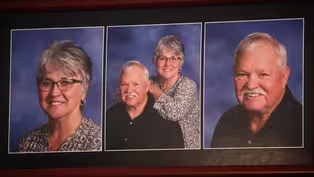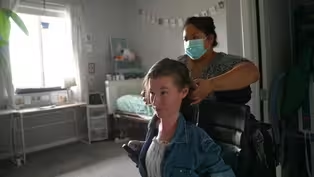
Best Care for Better Babies
Clip: Season 2 Episode 213 | 5m 1sVideo has Closed Captions
Learn about a community health program that offers free home visits by nurses in rural areas.
Learn about a community health program that offers free home visits by nurses in rural areas.
Problems playing video? | Closed Captioning Feedback
Problems playing video? | Closed Captioning Feedback
Iowa Life is a local public television program presented by Iowa PBS

Best Care for Better Babies
Clip: Season 2 Episode 213 | 5m 1sVideo has Closed Captions
Learn about a community health program that offers free home visits by nurses in rural areas.
Problems playing video? | Closed Captioning Feedback
How to Watch Iowa Life
Iowa Life is available to stream on pbs.org and the free PBS App, available on iPhone, Apple TV, Android TV, Android smartphones, Amazon Fire TV, Amazon Fire Tablet, Roku, Samsung Smart TV, and Vizio.
Providing Support for PBS.org
Learn Moreabout PBS online sponsorship♪♪ [Nebbe] As local maternity care fades from some rural areas, public health programs, including Osceola Community Health Services in Northwest Iowa, have implemented traveling nurse programs like Best Care for Better Babies, which have become essential in providing post-partum checkups, education and support, especially for first-time parents.
♪♪ [Amy Glade] Best Care for Better Babies is a longstanding program that started well over 25 years ago.
♪♪ [Amy Glade] It is a home visitation program where the nurses go into the home.
We really monitor growth and development on baby, we make sure mom is doing well.
♪♪ [Alexa Dagel] Nothing can really prepare you for parenthood I feel like.
I've grown up around children my entire life and I babysat as a teenager in high school and what not.
[Alexa Dagel] So, I was definitely a nervous first-time mom.
(knocks on door) Good morning.
How are you guys doing?
Good.
[Alexa Dagel] No two home visits are ever the same.
Just going over different developmental milestones.
Still requiring lots of cuddles.
[Alexa Dagel] We're nurses that go out into the home.
So, we have been exposed to a lot.
But I will say home visiting is not for the faint heart.
We're at 23 inches today.
[Alexa Dagel] You have to be ready to face any challenge in the home because you're there by yourself.
♪♪ [Jayda Hieronimus] Riley actually was diagnosed with reflux.
And not knowing at the beginning what reflux really was in the baby, it was kind of scary for us.
She was spitting up a lot, choking on it.
It's something simple like Riley is very spitty today, what can I do?
Or Riley is not eating as much, is this normal?
Alexa is always here to like tell us that it is okay for things like that to happen instead of going all the way to Spirit Lake and hearing the same thing there.
(door closes) ♪♪ [Nebbe] Programs like this can help reduce ER visits, identify health risks sooner, and improve outcomes for both mothers and infants.
And, for young mothers who may feel apprehensive or unprepared, the program offers much appreciated information and guidance.
Hey!
Hello, how are you?
Good.
How are you?
Good.
[Autumn Dake] I was a little scared.
Yeah.
I didn't know how to tell my mom.
I didn't -- yeah, it was just definitely not in the plan.
You can set her up there.
[Alexa Dagel] As a nurse, you see people on their worst days.
And so, just trying to be a little bit of a positive light.
What did you say he was at the doctor?
I think he was nine pounds, 13 ounces.
Okay, sure, so scales might differ a little bit.
Yeah, yeah.
You're strong, Amara.
[Alexa Dagel] It's easier to build a rapport with people when they are more comfortable.
There you go, baby.
Can I listen to your little heart?
[Alexa Dagel] Sometimes the mom puts on a good front when they come in, but they're really struggling and it's hard for them when they're out and about to show that.
But a lot of times we can break down that barrier when they're in the home.
[Abbie Bos] I got pregnant with my first child my senior year of high school.
And so, I was 18 at the time and I was not sure what I was getting myself into and I just needed that little bit of extra help.
♪♪ [Abbie Bos] I knew that it was going to be a huge step into a world that I don't think that I was ready for at the time.
They a hundred percent were like no, we will take you step by step and we will hold your hand.
And I think that is hundred percent kind of like the words and the courage that I needed at the time.
Peekaboo!
[Abbie Bos] They have been very fundamental in helping me and bringing me diapers in the times that I need and bringing me information when I need it and when I'm scared.
Also, the social part about it, like if I need someone to talk to, I can just be like hey, can we chat?
Like, I need someone.
And they come in here and they just kind of help me out and chat with me so I don't feel so lonely and stuck in the house all the time.
♪♪ [Abbie Bos] They're here to see you and to check in on you and just to sit there with you and be there with you is definitely the experience that I think that all young mothers need.
[Alexa Dagel] Helping them gain that confidence really motivates me.
♪♪ Can I get a hug?
Oh yeah, thank you!
Aww, big girl!
Video has Closed Captions
Clip: S2 Ep213 | 4m 41s | Meet John and Rosemary Appleby. John’s need for care has been an emotional journey for their family. (4m 41s)
Video has Closed Captions
Clip: S2 Ep213 | 4m 12s | Hannah Soyer, who has been receiving round-the-clock care since she was three years old, shares her (4m 12s)
Providing Support for PBS.org
Learn Moreabout PBS online sponsorshipSupport for PBS provided by:
Iowa Life is a local public television program presented by Iowa PBS













